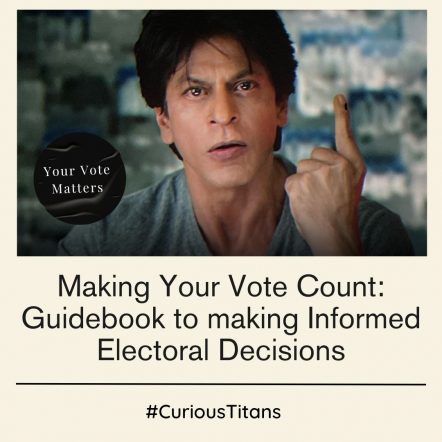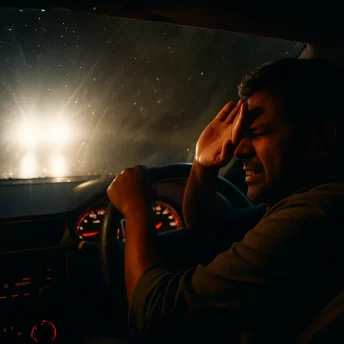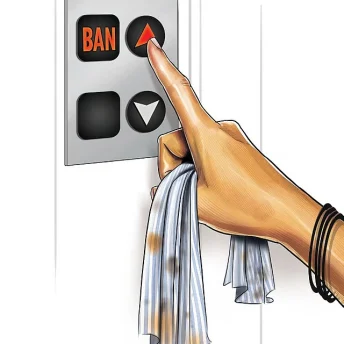Making Your Vote Count: Indian Voters Handbook for Informed Electoral Decisions
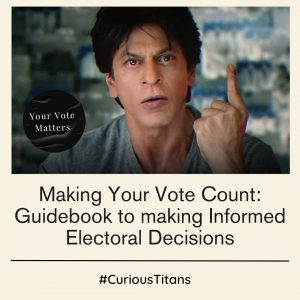
India’s elections spell out the rich diversity of castes, cultures, religions, languages, and traditions across the nation. Far from a regular political exercise, this electoral exhibition displays the character of a democracy, where citizens exercise their fundamental right to vote, choose their leadership, and clip the future of their nation in shape.
Within any electoral framework, irrespective of the demographics and degree of development, voters have a significant impact on the future trajectory of their country. But in a democracy like India—where the lives of one & half a billion inhabitants are solely driven by the decisions of policy makers, voters’ role is even more decisive. Through voting, they express their aspirations and viewpoints, entrusting not just theirs but the country’s future to those elected to serve.
However, authentic empowerment as a voter requires constant vigilance and informed decision-making—as it enables voters to identify and elect candidates committed to uplifting the interests of their country and upholding its democratic principles.
Don’t Let Ignorance Rule Over Your Intelligence
Undeniably that the Indian voters are relatively more ignorant than those in other democracies is a fact. Here voters lack the requisite knowledge to make the right decisions. Majority of voters in India latch on to the fact that their individual impact on electoral outcomes is negligible. This discourages them from investing time and effort in political education. The disparity between the potential influence of an individual vote and the effort required to grasp political awareness creeps along a cycle of ignorance.
“The ignorance of one voter in a democracy impairs the security of all.”
– John F. Kennedy, Former President of the United States
Ignorant voters are considered to be the disastrous wheels in the wagon of democracy. A voter who does not double-check on the candidates he entrusts his confidence in and casts his vote, there are chances of him delegating the power in the wrong hands. In a strong democracy, the role of educated and intelligent voters is important. This provides stability and development to the functioning of the democracy. Therefore, it is necessary to give importance to electoral literacy. This strengthens your active and informed participation in the democratic processes as a voter.
Even if you don’t read further, this monologue from the Bollywood film Jawan by Shahrukh Khan will sum up what I want to highlight. But scroll below further to know some of the ways to evaluate your candidate you want to vote for.
Utilise Election Commission of India (ECI) Resources to be an Informed Voter
Every voter needs to have the realisation of their role in elections and the value of their ballot. It’s not just about casting a vote to someone of their liking, but to make an important decision by selecting the right person for a position as influential as an MP or MLA. The website of Election Commission of India (ECI) can be your key resource to be a vigilant voter.

The Election Commision of India (ECI) website puts everything on display on its website. You can utilise this information for:
- Checking candidates’ background
Every candidate who contests in the election submits an affidavit of record while filing his nomination. This document provides a window into candidates’ backgrounds, e.g., criminal cases, financial assets, liabilities, educational qualifications, and others. With such valuable information on tap, you can filter and figure out the face of your constituency in elections, whether for the state assemblies or parliament.
- Empowering your electoral acumen
The ECI is the guardian of free and fair elections in India. It takes a proactive approach to ensure that voters have easy access to candidates’ information. To serve the purpose, it publishes candidates’ affidavits on its official website which anyone can access. These affidavits can be your instrument in empowering your electoral acumen—so that you can bet your ballot on the best among those running for the MP or MLA offices.
- Scrutinising candidates contesting in elections
ECI facilitates citizens to easily navigate the website and locate the information they are looking for. If you, for instance, want to access the details, track record, crime history of the candidates standing for MP and MLA seat from your constituency, you can go to the Candidate Affidavit Management Portal of ECI (https://affidavit.eci.gov.in/). With free access to these affidavits, you can scrutinise the credentials and track records of candidates contesting in elections.


- Making the right decision at the polls
You can download the affidavit of any candidate on the ECI website. Here, you can filter your search for candidates by constituency, name, or party affiliation. These affidavits will provide you with insights into the financial standing and legal history of candidates that you can use to make wise electoral decisions at the polls. But the sad part is that rarely any citizen shows any interest in taking a reality check about candidates before casting their votes.
Choose MP (Member of Parliament) not PM (Prime Minister)
In the history of Indian politics, particularly during elections, it has been a prevalent practice since the old days of Congress government to prioritise PM candidates as the the face in elections. The strategy of putting PM candidates forward in the elections misled the voters. We, as conscious and intelligent electorates, need to change this rooted pattern and shift our focus on electing the members of parliament (MPs).
Democracy in India is guided by a parliamentary system, where the Prime Minister is selected by the legislative body of elected parliamentarians. Since as a voter, you do not have any direct role in electing the prime minister, your sole focus should be on picking the deserving candidates to represent your constituency in the parliament. Sending the right representatives to the Lok Sabha ensures they’ll pick strong leadership to steer the nation forward.
Examine Candidates’ Track Records rather than Relying on their Speeches
It is extremely important to examine the track record of candidates in fulfilling past promises and public responsibilities. By examining leaders’ past actions, their commitment to deliver promises can be evaluated, which provides clues to their future actions. Additionally, this evaluation sheds light into a candidate’s stability and trustworthiness, which is essential for voters’ trust and support.
As a responsible voter, it is important to check the past record of your candidate. Check the track record of your candidate to see if there is any scam or corruption allegation here.
On this website you can check how much the MP as contributed in the parliamentary debates and the attendance track records https://prsindia.org/mptrack
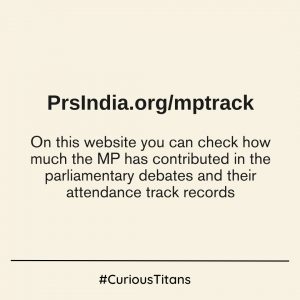
When we vote, we become a sensitive part of our country’s future. Therefore, we should use our voting properly to elect the candidate who is committed to working with clean policies and honesty. By electing a person involved in corruption and scam, we can jeopardise the future of our countrymen.
Say No to Criminal Influence in Politics
Indian voters’ tolerance for politicians with criminal records remains a concerning trend. Despite the alarming increase in MPs with declared criminal cases since 2009, comprising 233 out of 539 winners, voters’ choices seem driven more by perceived effectiveness than ethical considerations. Shockingly, nearly 29% of elected MPs had serious criminal charges against them, ranging from heinous crimes like rape and murder to offenses against women.
Such statistics reveal a disturbing reality wherein winning probabilities are significantly higher for candidates with tarnished backgrounds, at 15.5%, compared to those with clean records, standing at a mere 4.7%. This pattern is exemplified by cases like Congress MP Dean Kuriakose, who won from the Idukki constituency in Kerala despite declaring a staggering 204 criminal cases against himself.
This table illustrates the steady rise of criminal influence in politics over the years:
| Year | Percentage of MPs with Criminal Charges | Percentage of MPs with Serious Criminal Charges |
| 2004 | 12% | 15% |
| 2009 | 15% | 18% |
| 2014 | 21% | 24% |
| 2019 | 43% | 29% |
It is evident that the electorate’s preference for politicians with questionable backgrounds pushes criminalization within the corridors of power. Therefore, voters need to empower themselves with information about candidates’ criminal histories and to uphold clean governance, the values of lawfulness, and public trust.
Evaluate Candidates’ Understanding of the Local Issues and Community Needs
Assessing candidates’ understanding of local issues and needs is an important step that reveals a capable and responsive leader. This assessment will help you measure candidates’ ability to listen to the voices of the local community and understand their needs, as well as how they attempt to address these issues. It also shows how well the candidate can support, communicate and convene so as to be helpful in the development of the constituency and its community.
Wrapping-up
In essence, elections are not merely about picking preferred individuals to hold positions of power—they are about deciding upon the leadership to secure democracy and scale the economy up. By actively participating in the electoral process as a vigilant voter, you can contribute to setting up a government— one that is driven by democratic principles and that works to uphold the ideals of freedom, equality, and justice.
Use the following links to check your candidate background:
- Candidate Declarations: https://affidavit.eci.gov.in/
- MP Track Record: https://prsindia.org/mptrack

